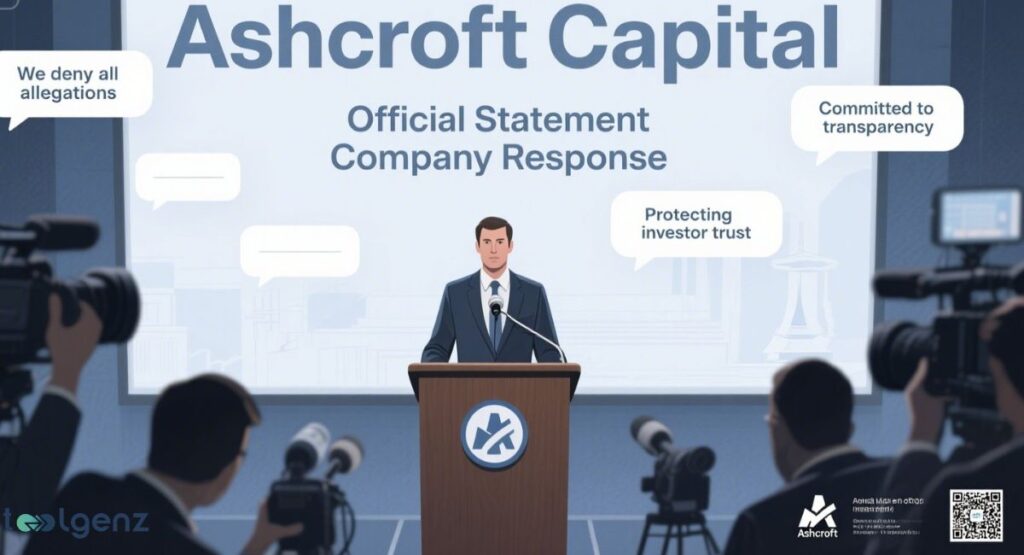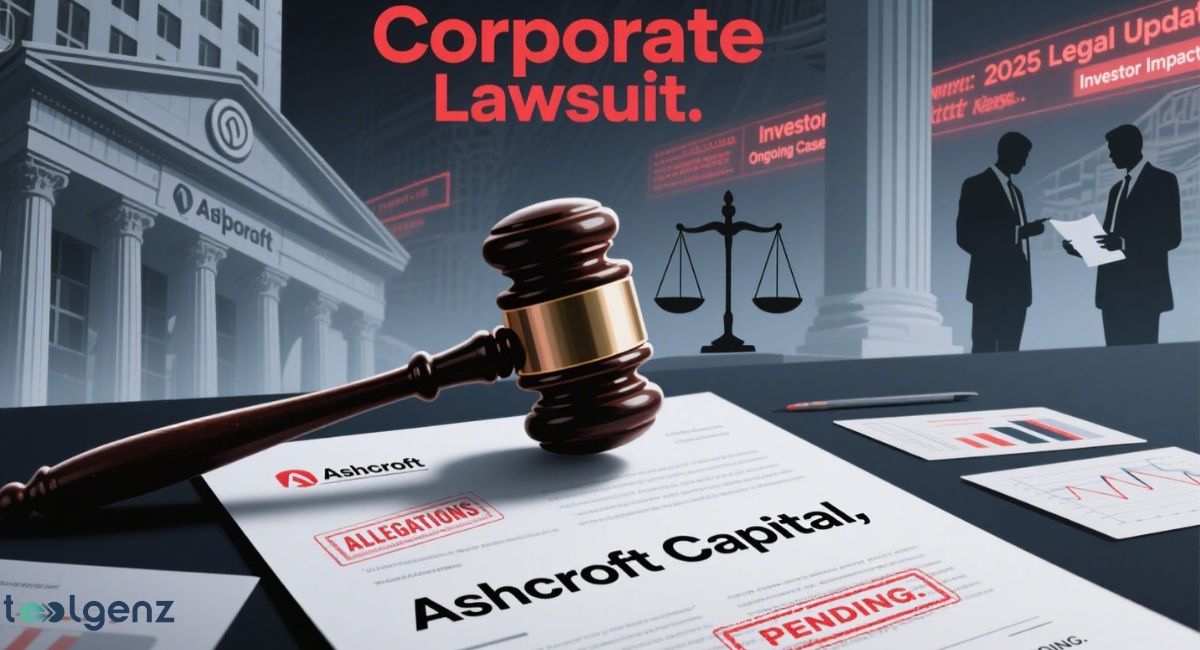What Is Ashcroft Capital and Why Is It in the Spotlight?
The Ashcroft Capital lawsuit has caught the attention of many real estate investors in the U.S. Known for its success in real estate syndications, Ashcroft Capital now faces serious legal challenges in 2025.
Investors are raising questions about investment risks, missing payouts, and misleading returns. We’ll walk you through the key facts, from major allegations to where the case stands now—and what it could mean for your investment.
We’ll explain the case simply and clearly so that you can understand your rights and next steps. No matter your experience level, this article shares practical insights to help you stay informed and protect your real estate investments.
As more details emerge, it’s essential to stay informed and cautious. Understanding how these legal issues may impact your existing or future investments can help you make smarter, safer financial decisions.
What Is the Ashcroft Capital Lawsuit About?

The Ashcroft Capital investor lawsuit involves claims of investment fraud, breach of fiduciary duty, and misleading investment projections.
A group of investors filed a case alleging that the company failed to disclose key investment risks and misused investor funds.
The suit is being seen as part of a wider concern over real estate syndication risks in the industry. One key focus is on documents like the Private Placement Memoranda (PPM).
Investors argue these didn’t include full risk disclosures. This legal action has made headlines under the title Ashcroft Capital class action 2025.
Many now ask, “Is Ashcroft Capital being sued?” and seek answers about how to sue investment firms if misled.
Legal experts say this case could set a precedent for how real estate syndications are managed and marketed.
If proven, the allegations may lead to tighter SEC regulations and encourage greater transparency across similar investment platforms.
Key Allegations and the $427M Cross-Collateralized Loan Controversy
At the heart of the lawsuit are claims that Ashcroft used a $427M loan Ashcroft Capital secured in 2022 through cross-collateralized loan structures without proper investor knowledge.
Some properties were grouped to get favorable financing, but details were not fully disclosed. Critics say this created confusion over asset ownership and risk.
Other allegations include unauthorized use of funds, lack of stakeholder trust, and selling or refinancing properties early to benefit the company, not investors.
These claims contribute to rising concerns about round-tripping in real estate, where the same asset is bought and sold to inflate performance metrics.
If proven true, these practices may violate SEC rules and investor agreements, potentially leading to financial penalties, rescission offers, or changes in how future deals are structured.
For investors, it underscores the importance of transparency and due diligence when evaluating syndication opportunities.
Latest Ashcroft Capital Lawsuit Update (2025)

As of June 2025, the Ashcroft Capital lawsuit update shows that no final judgment or legal settlement has been reached.
Court filings include emails, contracts, and internal communications that may support claims of Ashcroft Capital fraud. Both sides are preparing for trial if no agreement is made.
The firm continues to deny wrongdoing. But sources close to the case reveal settlement talks are ongoing. Some speculate that a resolution could arrive by late 2025, though others believe the process will drag due to the case’s complexity.
Legal analysts say the outcome could have ripple effects across the real estate investment space, influencing how future syndications disclose risk, manage capital, and communicate with passive investors.
Until then, affected investors are urged to track updates closely and consider speaking with legal counsel.
Legal Outcomes and What They Could Mean for Investors
If Ashcroft loses the case, the company could face fines or be forced to repay investors. A court ruling could trigger a large class action lawsuit payout.
However, if the claims are dismissed, Ashcroft may avoid penalties but still face reputation damage.
Investors wonder, “Is my investment safe with Ashcroft Capital?” Legal experts suggest reviewing portfolios and preparing for possible fund recovery processes.
These outcomes may also set future standards for real estate litigation and real estate compliance.
This case shows why thorough research, honest reporting, and investor awareness are more important than ever in private syndications.
No matter the outcome, it serves as a wake-up call for both sponsors and investors in the real estate space.
For another high-profile case involving investor concerns and legal claims, check out our Drive Social Media Lawsuit 2025 article.
Ashcroft Capital’s Response and Public Statements

In response, Ashcroft Capital has issued statements saying it complies with SEC regulations and follows proper procedures.
The firm insists that Private Placement Memoranda (PPM) were shared and contained all necessary risk data. They deny all fraud accusations.
Additionally, CEO Frank Roessler said in a letter to investors that they are reviewing investor communication methods and operational restructuring options. The firm wants to rebuild stakeholder trust through more transparent updates.
The company has also increased outreach efforts through webinars and investor Q&A sessions to address concerns directly.
While the outcome remains uncertain, Ashcroft’s public response signals a shift toward damage control and potential governance reforms.
Investor Reactions and Community Sentiment
Reactions from the investment community are mixed. Some investors support the lawsuit, sharing concerns about Ashcroft Capital transparency issues and reduced returns. Others express hope that the firm can resolve the case and recover investor trust.
On forums like Ashcroft Capital Reddit discussions, users debate what went wrong and whether the real estate syndications model is flawed.
The case has raised wider questions about fiduciary duty and what rights passive investors truly have.
Financial advisors recommend that passive investors stay informed, review their syndication agreements, and consider diversifying their portfolios.
Regardless of the outcome, the lawsuit has sparked important conversations about accountability and risk in private real estate investing.
The Impact on Real Estate Syndication and Private Equity
The lawsuit is creating ripple effects across the real estate finance sector. Experts predict more scrutiny for real estate funds, tighter risk disclosure rules, and a demand for better investor due diligence. Firms may also face new legal tests around compliance.
This case may change how real estate investment firms pitch deals and manage funds. If found guilty, Ashcroft’s practices could be seen as a warning for others.
It calls attention to how crucial it is for firms to manage investor capital with care and integrity.
Industry leaders are already calling for updated best practices, third-party audits, and greater transparency in syndication structures.
The outcome of this case could redefine investor protections in an industry traditionally built on trust and private agreements.
Lessons Learned and Legal Advice for Real Estate Investors

Investors should always ask detailed questions about investment risks, returns, and how their money is used.
Legal advisors recommend carefully reviewing PPMs, tracking fund performance, and not relying on verbal promises. This lawsuit also shows the value of checking for conflicts of interest.
If you’re involved in a case like this or fear fraud, it’s important to learn how to file investor complaint 2025 correctly and seek legal help.
This event is a reminder that real estate syndication risks are real and investor protection real estate funds must remain a top priority.
Going forward, investors are urged to document all communications, request regular reporting, and consult with a securities attorney before joining private placements.
This case makes it clear: doing your homework before investing isn’t just smart—it’s essential.
FAQS
What is the current status of the Ashcroft Capital lawsuit?
The Ashcroft Capital lawsuit remains active and pending as of June 2025, with the case still in discovery and settlement discussions underway.
Who is the CEO of Ashcroft Capital?
The CEO and co-founder of Ashcroft Capital is Frank Roessler.
Where is Ashcroft Capital headquartered?
Ashcroft Capital is based in New York, NY, with its main office located at 800 3rd Ave, Suite 2210.
What is the Ashcroft decision?
As of now, no final ruling or verdict—commonly referred to as the Ashcroft decision—has been issued; the case remains open and unresolved.
What is the Ashcroft Income Note?
The Ashcroft Income Note is a fixed-income investment product offering accredited investors approximately 10% annual interest, paid monthly, with no fees and a first-loss position maintained by the company.
Where can I get official information about Ashcroft Capital?
For official updates, statements, and investment information, visit the Ashcroft Capital website .


